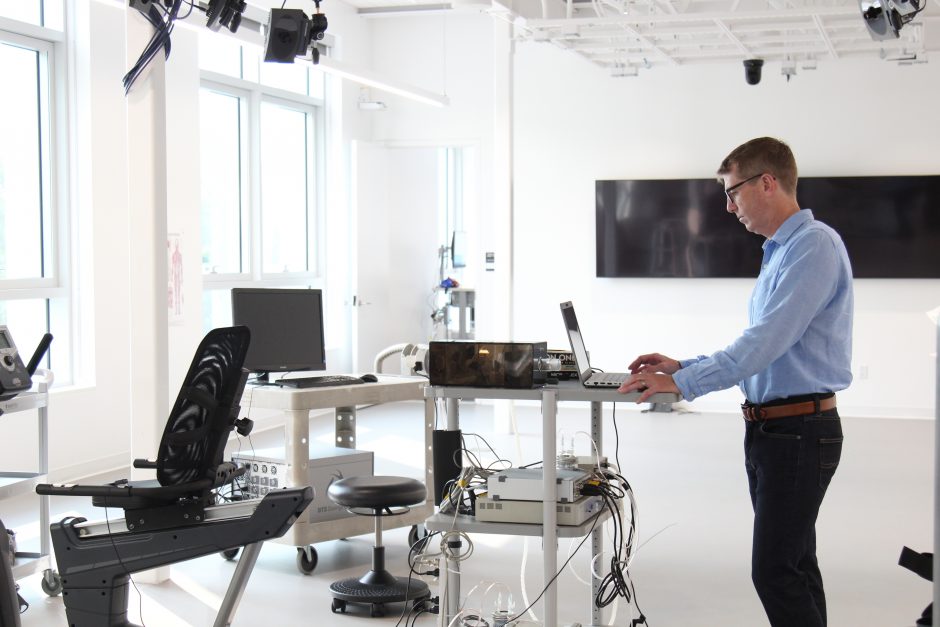 Dr. Bill Sheel, professor with the School of Kinesiology wears many hats: He is head of the Health and Integrative Physiology Lab within the School of Kinesiology. He teaches two courses, supervises shy of 10 grad students, is the Associate Editor of three journals and sits on the Editorial Board of the Journal of Applied Physiology.
Dr. Bill Sheel, professor with the School of Kinesiology wears many hats: He is head of the Health and Integrative Physiology Lab within the School of Kinesiology. He teaches two courses, supervises shy of 10 grad students, is the Associate Editor of three journals and sits on the Editorial Board of the Journal of Applied Physiology.
He’s also deeply committed to his research, where he is focused on exercise science, and, namely, oxygen absorption for the creation of energy. “I’m interested in how we get oxygen from the air to the mitochondria,” he says. Though the process from start to finish includes many steps, Bill’s work is focused primarily on the first two steps – breathing and the cardiovascular system, and how these two systems interact. “And I study exercise as a model to alter these systems because it’s a very relevant term to help understand human biology,” he says.
Bill became interested in these systems for a couple of reasons, but it started during his undergraduate degree at the University of New Brunswick. “There were these modules to move through in physiology class,” he says. “The respiratory sections made the most sense to me, and I just did well in this portion of the program. It’s a little bit like an engineering system. But the other reason is that the respiratory system is the first and only line of defense in terms of gas exchange. As they say, if you’re not breathing, nothing else matters.”
From these general themes, Bill and his team have come up with a number of other questions they’re interested in answering, including the differences in these systems and processes when you factor in biological sex. When asked how this interest formed, Bill says, “Just the general lack of information and the bias in science and publications that’s very clear. Funding agencies now require you to justify if you’re only studying one sex.”
Bill points out that there are a lot of differences between the sexes, but a lot of similarities too, and maybe we have yet to ask the right questions. “A paper I read from the 80s, though published in a different era, had only one female in the given study who had very different data than the rest of the participants.” This got Bill asking different questions. “These questions have a number of implications beyond the scope of kinesiology as people know about it,” he says. “For example, we’ve learned through studies that the female diaphragm is more resistant to fatigue. Is that the same under all physiological and pathophysiological conditions? As one example, what are the implications for ventilating men and women in the ICU?”
Bill has focused his attention on dyspnea – or the feeling of shortness of breath – in aging individuals, for which he received nearly $200,000 of federal funding in 2017 to study the sex-based differences. This has been a challenging focus, he admits. “It’s tough because here we’re dealing with psychobiology; you have the act of breathing, but the muscles involved in breathing have inputs into the brain, and we perceive the act of breathing. When we speak about dyspnea, women report to experience it more frequently than men – both related to exercise and disease – and this is a complicated issue. I’m not entirely convinced it’s all biology. It’s important to examine who is asking what questions about respiratory sensations, and how are they asking them.”
The questions Bill poses around aging do also inform his personal life and his own approach to exercise outside of research. “I do something every day. The aging thing is coming into mind as of late, if you must know,” he says. “49 is not 29.” Bill gets up early most days to do something, and that’s advice he seems ready to share with anyone without preaching. “It’s clear that being physically active conveys health benefits, that’s not up for debate. So doing something every day is what you need to be doing. Whatever you’re doing now, do a little bit more is probably a good idea.”
Bill is hoping this research will lead him to some big answers around differences in exercise for the biological sexes. Questions like are we prescribing exercise to men and women the same way, and should we be, is what he’s hoping to tackle.
Having the ability to address some of these questions is integral to answering the question Why UBC? for Bill. “The nice thing about being at UBC is that if there’s something you want to do or measure, it usually can be done with the help of others. I have found great scientific colleagues across campus.”
His new lab in the Chan Gunn Pavilion, which he moved into in December 2018, is changing the way he and his research team interact with other colleagues. “In the 10 years prior, I’d be hard pressed to think about when I’ve sat down and talked to these other scientists and clinicians with any regularity. They are now down the hallway from me and we are routinely engaged in scientific discussions that were not happening before moving into the Chan Gunn Pavilion.”
But when I ask Bill what he’s most proud of here to date, he answers unequivocally, “My students. They’ve all gone their own path, some of them now with their own grad students, some went into medicine, some work for the government or industry. I’m equally proud of all of them. I’d like to think that each of them, regardless of their trajectory, have benefited from time in the lab and it has helped to shape the career they wanted to have.”